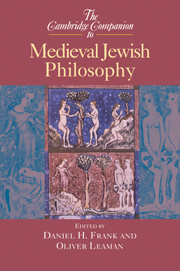Book contents
- Frontmatter
- PART I BACKGROUND AND CONTEXT
- PART II IDEAS, WORKS, AND WRITERS
- 4 Saadya and Jewish kalam
- 5 Jewish Neoplatonism
- 6 Judah Halevi and his use of philosophy in the Kuzari
- 7 Maimonides and medieval Jewish Aristotelianism
- 8 Maimonides and the sciences
- 9 Medieval Jewish political thought
- 10 Judaism and Sufism
- 11 Philosophy and kabbalah
- 12 Arabic into Hebrew
- 13 Philosophy in southern France
- 14 Conservative tendencies in Gersonides’ religious philosophy
- PART III THE LATER YEARS
- Guide to further reading in English
- Index
5 - Jewish Neoplatonism
Being above Being and divine emanation in Solomon ibn Gabirol and Isaac Israeli∗
from PART II - IDEAS, WORKS, AND WRITERS
Published online by Cambridge University Press: 28 May 2006
- Frontmatter
- PART I BACKGROUND AND CONTEXT
- PART II IDEAS, WORKS, AND WRITERS
- 4 Saadya and Jewish kalam
- 5 Jewish Neoplatonism
- 6 Judah Halevi and his use of philosophy in the Kuzari
- 7 Maimonides and medieval Jewish Aristotelianism
- 8 Maimonides and the sciences
- 9 Medieval Jewish political thought
- 10 Judaism and Sufism
- 11 Philosophy and kabbalah
- 12 Arabic into Hebrew
- 13 Philosophy in southern France
- 14 Conservative tendencies in Gersonides’ religious philosophy
- PART III THE LATER YEARS
- Guide to further reading in English
- Index
Summary
INTRODUCTION AND METHODOLOGICAL OVERVIEW
Defining Jewish Neoplatonism is no easy task, due in no small part to the difficulty of defining “Neoplatonism.” In an effort to best understand these categories, I will isolate two conceptual issues – the nature of the Godhead, and its relation to the cosmos – in Plotinus (the pagan third-century founder of Neoplatonism), and then, with recourse to Solomon ibn Gabirol in the first case and Isaac Israeli in the second, I will examine the extent to which these issues can be seen to exist – unmodified – within the corpus of Jewish Neoplatonism. By suggesting, first, ways in which each of these Plotinian issues seems, prima facie, at odds with the parallel Jewish Neoplatonic views, but then by emphasizing how in fact they are reconcilable with the Jewish versions, I will challenge oversimplified estimations not only of the nature of Plotinus' own philosophy, but of what real differences exist between it and Jewish Neoplatonism. In this way I will have indirectly been examining what exactly counts as “Neoplatonism,” Jewish or otherwise. By proceeding in this way, I hope to do justice to the elusive connections that exist between various Neoplatonic textual traditions. By focusing on the works of two early Jewish Neoplatonists, this chapter, rather than attempting to be comprehensive, suggests conceptual starting points from which one might address and evaluate the degree, implications, and development of Neoplatonism in any number of other Jewish texts.
- Type
- Chapter
- Information
- The Cambridge Companion to Medieval Jewish Philosophy , pp. 91 - 110Publisher: Cambridge University PressPrint publication year: 2003
- 11
- Cited by



